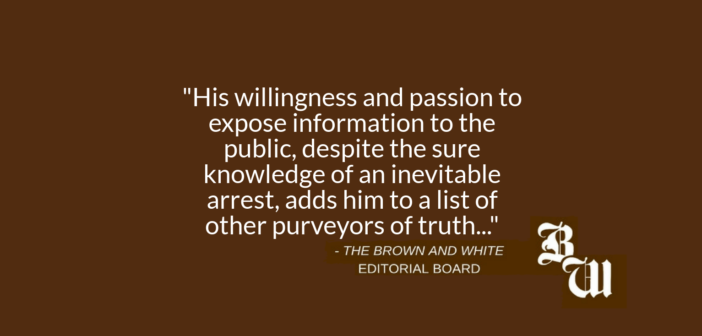It is not uncommon for journalistic ethics to conflict with the law.
As journalists, we consistently strive to promote public accountability for those in positions of power, and oftentimes this goal comes at the expense of what is technically legal, but not necessarily what is just.
The recent arrest of Australian computer programmer and journalist Julian Assange brings these ethical debates to center stage, forcing journalists, lawmakers and people alike to debate whether the law comes before the people’s right to be informed.
As the founder of WikiLeaks, Assange has been at the forefront of many discussions surrounding both technological information and international politics.
Coined frequently as an “anti-secrecy crusader,” Assange’s arrest follows since-verified rumors “that his group dumped classified and politically volatile materials onto the Internet.” According to The Washington Post, “U.S. prosecutors confirmed for the first time that they had secretly charged Assange last year with conspiring with an Army intelligence analyst to illegally obtain secret U.S. military and diplomatic documents, which Assange’s group published online.”
To many, Assange’s loyalties to the public deem him as a criminal, and his computer intelligence and hacking abilities make him a double threat to under-wraps political happenings and government secrecy.
While hacking into government databases and exposing their contents are objectively criminal offenses, defenders of Assange raise the question of whether his commitment to accountability is justifiable.
His willingness and passion to expose information to the public, despite the sure knowledge of an inevitable arrest, adds him to a list of other purveyors of truth such as Edward Snowden, who tweeted that his arrest served as “a dark moment for press freedom.”
Assange, who was arrested in London, was expelled from the Ecuadoran Embassy. Upon being granted asylum in Ecuador in 2012, Assange has been avoiding extradition to the United Sates and is at risk of significant legal trouble upon the dodging of warrants in addition to current allegations.
WikiLeaks cases and other circumstances of “info-dumping” have consistently raised ethical debate. Contributing this mindset into journalism raises justifiable distrust within the media and leads to increase the already existing mindset of both grave political and media distrust.
People are forced to question what else is being withheld at the sake of keeping in practice with the law. While some of his practices are characterized journalistic ethics, those who are fans of the freedom of the press may still justifiably view Assange as a threat to national security.
They might also justify the fear that the rising amount of generalized computer intelligence serves as an additional threat to national security.
Assange’s unrelenting willingness to protect the identity of his sources is not an uncommon practice in professional journalism and has historically been grounds for many journalists’ arrests in the past. Arrests like Assange’s also verify the extreme amounts of information that are continuously being withheld from the people.
Publicizing government information that has been intended to be kept private is illegal, but having access to classified information of this type and not sharing it with the people is differently, but equally unjust in the eyes of the press.
While his arrest does go to serve what is technically legal, it defaces the acts of bravery Assange has displayed, and deeply violates both journalism and free press ethics.






Comment policy
Comments posted to The Brown and White website are reviewed by a moderator before being approved. Incendiary speech or harassing language, including comments targeted at individuals, may be deemed unacceptable and not published. Spam and other soliciting will also be declined.
The Brown and White also reserves the right to not publish entirely anonymous comments.
1 Comment
Abortion, legal, popular, formerly unethical Do no harm! The truth, life ends.
Can the press be brave by not publishing truth in certain circumstances?